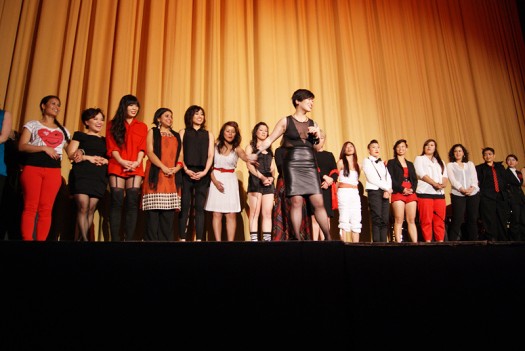The cast of a special Asian Pacific American production of 'The Vagina Monologues—performed on May 17th in San Francisco—acknowledged a few individuals at curtain call, including family members, NAPAWF Bay Area, and others who made the production possible. (photo credits: Karen Datangel)
On the topic of sexuality, voices are silenced. Speaking out about sexual desires is considered improper for women and much more alarmingly, speaking out against violence towards women-as survivors of it or as supporters of survivors-is difficult, for the pain and suffering is all too much to relive the ordeals. However, through theater, these stories of women exploring their sexuality and surviving sexual assault, war, and domestic violence can be told boldly and with absolutely nothing held back. Eve Ensler‘s The Vagina Monologues goes deep into the varied experiences of the female organ, and performers and activists from the Asian Pacific American community went all out in their recent opportunity to honor the strength and courage of women everywhere, even in the face of adversity.
In honor of Asian Pacific American Heritage Month, the National Asian Pacific American Women’s Forum (NAPAWF) and V-Day San Francisco co-presented a landmark production of The Vagina Monologues on May 17th at San Francisco’s historic Castro Theater. Under the direction of Gabrielle Patacsil, the all-Asian Pacific American cast of women from different walks of life came together to perform in this very special presentation, the first by the only national, multi-issue Asian and Pacific Islander women’s organization in the country. Proceeds benefited the Bay Area chapter of NAPAWF and V-Day.
For many of the APA women performers, including Connie Chung, who works at the Asian Women’s Shelter in San Francisco, participating in the production was a valuable chance to address taboo issues amongst the community.
“In media and arts and entertainment, Asian-Americans have such a small presence because of the different barriers that don’t allow them to take front stage,” said Chung. “To have a discussion about sexuality and empowerment is so important, so to bring those two together is such a rare opportunity.”
Chung also spoke of the shared sense of community behind-the-scenes. “Over these past couple of months, we weren’t just rehearsing scripts but also having serious discussions about family violence, violence in our communities, insecurities, our parents, our weights…all those things you wish you could talk to about with somebody,” she said. “This space really provides it.”
For their big night, in a way, the cast was able to extend on those discussions in public through performing The Vagina Monologues. The superbly enthusiastic crowd of about 1,000 audience members were highly vocal throughout the show, but stood in silence and solidarity when narrator Jennifer Pae asked if any of the female viewers were affected by assault or violence or knew somebody who was. After a video presentation about NAPAWF’s mission and another video introducing some of the performers, the show was underway, opening with a rendition of the song “Golden” by Jill Scott and performed by Jennifer Low, Ellisa Hammersia, and Erin Pangilinan. The performers remained on stage as they waited their turns to take over and to support each other, reacting along with the crowd every step of the way-blushing, laughing, tearing up, and wildly applauding.
The Vagina Monologues touched on every aspect of sexuality that mainstream media could never be able to touch with unflinching honesty. Segments based on the real experiences of women torn by civil conflict, rape, female genital mutilation, and even the politics stemmed from natural disaster shook the audience to the core, though it only meant that the production achieved a goal in bringing awareness to these very real issues. “I want [the audience] to sit with their discomfort,” said performer Judy Tan, a post-doctoral fellow at the University of California San Francisco. “I want them to walk away feeling uneasy and not be able to put that discomfort down so easily. I really want them to wrestle with what they’ve heard tonight and experienced.” One particularly gut-wrenching piece was performed by Jade Law, entitled “My Vagina Was My Village.” The monologue, based on the accounts of Bosnian refugees, poetically refers to “green water, soft pink fields, cow mooing, sun resting,” a paradise viciously destroyed by the invasion of military men. Law effectively places herself into the shoes of one survivor speaking for many, graphically describing the anguish of the rapes and torture of the women in the war-torn region.

Varsha Singh's monologue was based on one woman's positive experience with a man.
Some pieces walked lines between sadness and sweetness, such as “The Flood” performed by Emmy Pierce, based on a 70-year-old woman’s sexual repression, and Kristina Gerolaga‘s “The Little Coochi Snorcher That Could,” expressing one woman’s traumatic experiences involving her “coochi snorcher” (As she came to know her lady parts as, thanks to her mother) over the years until a liaison with an unexpected lover allows her to come to terms with her sexuality. Other monologues were more dominant in their humor, balancing heaviness in some pieces with their more light-hearted yet inspiring takes on the female sexual experience. A couple of big crowd-pleasers included “My Angry Vagina,” where director Patacsil passionately ranted about douches (The actual products, not men in particular), tampons, and such objects amongst other grievances, and “The Woman Who Loved to Make Vaginas Happy,” where executive producer Julia Rhee ecstatically echoed the many different possible moans women make during sex.
The show ended quite fittingly with Lisa Lee playing Ensler in “I Was There in the Room,” the playwright’s first-hand account of witnessing her first grandchild being born. The theme of birth and relating the vagina to the heart-as organs that “expand…ache…stretch…and bleed and bleed us into this difficult, wondrous world”-was resonant to the message of the entire performance and served as a reminder of how powerful the vagina truly is.

Lisa Lee took on ‘The Vagina Monologues’ scribe Eve Ensler's first-hand account of witnessing the birth of her first grandchild.
Rhee said that she hoped this particular production would be seen as more than a show and would raise the profile and issues of Asian Pacific American women. The trafficking and domestic violence rates in the demographic are high: According to NAPAWF, API women consist of the majority of trafficked persons into the US, and immigrant API women are three times more likely than American-born women to experience domestic violence. However, as the mission to stop the violence continues, there are positives that Rhee hoped audience members would take away after watching the play.
“I want them to take notice that Asian Pacific American women are resilient, strong, and sexually empowered,” said Rhee. “They have desire, they care about community. We’re not passive–we’re happy and we’re angry. It’s really about linking the community, the arts, and education all together, in a great package, sexy show form!”







